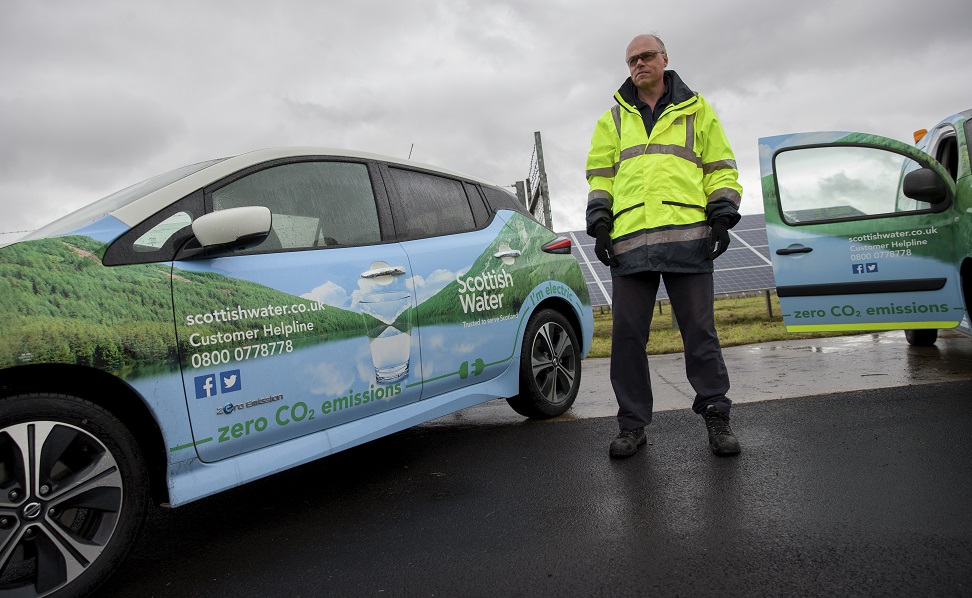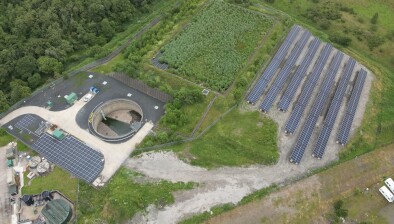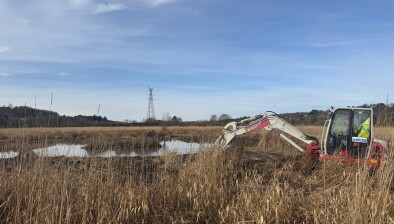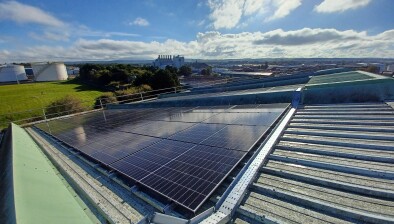Scottish Water outlines net zero emissions routemap
Scotland’s daily requirement for more than one billion litres of water will be delivered entirely on renewable energy by 2040, under a new plan published today.

Douglas Millican
Scottish Water’s Net Zero Emissions Routemap outlines a new approach which fully embraces low-carbon energy, materials, products and construction and storage of unavoidable emissions.
It includes commitments to running the nation’s water and waste water systems, which are energy-intensive, on green power and operating a fully emissions-free fleet of vans and tankers and cutting mileage by 50%.
Over the next 20 years, Scottish Water will prevent over three million tonnes of emissions – the equivalent of half a million car journeys around the world – entering the environment.
The public water and waste water organisation, which is one of Scotland’s biggest users of electricity, aims not only to reach net zero – but to go beyond that by reducing or eliminating all emissions associated with its activity, not just those it produces directly. This includes reducing the carbon emissions from its multi-billion pound infrastructure improvement programme.
The routemap, published at the start of Climate Week, sets out how Scottish Water will deliver on its commitment to reach net zero emissions by 2040, five years ahead of the national target. It has been created with the support of an expert panel.
It outlines how Scottish Water will tackle emissions across five key areas - electricity, processes, gas, transport and travel and investment - and states that the organisation will:
- Operate all of its assets, including 239 water treatment works and 1827 waste water treatment works across Scotland, using renewable power
- Transition its entire fleet of vehicles, currently 1600-strong and one of the most high-profile in the country, to zero emissions vehicles and reduce mileage of 17 million miles per annum by 50%
- Reduce the carbon intensity of its £700m a year investment by 75%, with a similar reduction in its supply chain, by adopting zero emissions design and using low carbon construction materials
Scottish Water chief executive Douglas Millican said: “The changing climate will increasingly threaten our ability to deliver services that are essential to everyday life for households and businesses across Scotland. We must deal with the climate challenges, secure the future reliability of our services, and eliminate the greenhouse gas emissions that are contributing to the climate emergency. Our commitment to reach net zero emissions by 2040 is our contribution to the national and global effort to addressing the climate emergency.
“The net zero emissions routemap published today sets out details of the enormous challenge we face and the transformation which must happen in order to reach our commitment.
“This will not be easy. We have a substantial emissions footprint due to the large amounts of electricity and chemicals we use. This routemap is about doing everything possible to minimise the emissions associated with our activities, irrespective of where they are generated, and maximise the positive contribution we can make. We will work with all parties involved in our investment programme to secure radical carbon reductions in our construction activities.”
He added: “Over the next 20 years, dealing with the challenge of climate change, achieving net zero emissions, and replacing our ageing assets will require significantly increased annual investment. We know customers don’t want us to put off necessary investment to protect the environment and maintain the high levels of service they currently receive. We will need their continued support so that we can build a sustainable future together.”
Climate change secretary Roseanna Cunningham said: “The COVID-19 pandemic has been an unprecedented global crisis which has fundamentally changed almost every aspect of our lives. But the climate emergency has not gone away – far from it – and we remain wholly committed to ending Scotland’s contribution to climate change.
“We all need to work together with truly national endeavour to achieve this, and I commend Scottish Water’s leadership in setting out its Net Zero routemap, in doing so demonstrating how the transformation that will be needed right across our public sector in order to deliver net zero can be achieved.
“I particularly welcome the focus on near-term actions, the contribution to development of key low carbon technologies and the delivery of renewables and nature-based solutions.
“Scotland has the toughest target of any country in the world for emission reduction by 2030. At 75%, this incredibly stretching target goes far beyond what the IPCC Special Report says is needed globally to prevent warming of more than 1.5 degrees, but achieving it will require rapid, sustained and planned progress of the kind Scottish Water is demonstrating.”
Terry A’Hearn, chief executive of the Scottish Environment Protection Agency, said: “The scale of the environmental challenge facing humanity is enormous and with a real urgency to act. Scottish Water’s commitment to delivering Scotland’s daily water entirely on renewable energy is a clear demonstration of the way that challenge is being faced head on.
“By outlining how it will fulfil its ambition to go beyond what the law requires in reducing its use of our planet’s ecological resources and services, Scottish Water’s Net Zero Emissions Routemap has the potential to be an example of a drive towards One Planet Prosperity in action. SEPA will continue to support Scottish Water to find and take opportunities to comply with regulatory requirements - and to go beyond compliance in ways that enhance the environment, minimise resource use and maximise long-term social and economic benefits.”
Chris Stark, chief executive of the Committee on Climate Change, and a member of an Expert Panel advising Scottish Water, added: “Scottish Water already manages one of the key climate risks – climate change will transform Scotland’s water supplies and needs in the decades ahead. So I’m delighted to see Scottish Water extend their climate focus and accept their unique role in cutting Scotland’s greenhouse gas emissions.
“The assets at Scottish Water’s disposal and the renewable energy opportunities on Scottish Water’s estate are vital contributors to the national goal of Net Zero by 2045. Their drive to cut carbon throughout their extensive supply chain will have a cascading impact throughout the Scottish economy. I hope other public bodies in Scotland will now match Scottish Water’s ambition – and their willingness to disclose their climate impact overall.”
The route map highlights that some emissions cannot be eliminated completely and that Scottish Water will counter balance and mitigate unavoidable greenhouse gases by increasing its approach to biodiversity through projects like peatland restoration which can store carbon.

















